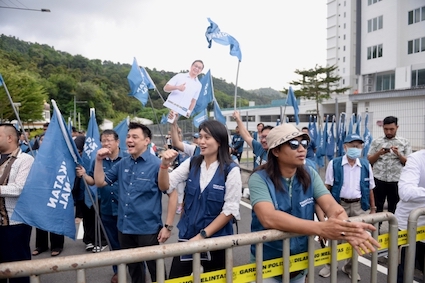Penang vulnerable to Perikatan advance if unity government doesn’t buck up, analysts say

Perikatan Nasional (PN) could win a simple majority to take over the Penang state government in four years’ time if the Pakatan Harapan-Barisan Nasional (PH-BN) unity government is not careful, warned analysts.
(MMO) – The Opposition coalition went from winning a sole state seat back in 2018 to 11 seats in the recent state elections which is a sign that the unity government should take heed or face losing more seats in future, they said.
“They should worry and worry big time. PN now has more than 25 per cent of Penang state seats,” said Senior Fellow of Singapore Institute of International Affairs Oh Ei Sun.
He said theoretically, PN can make further inroads to win all the Malay and the mixed seats in the state, putting it within reach of a simple majority.
“As can be seen in both Penang and Selangor, urbanisation does not detract from many voters’ spiritual yearnings,” he said.
Universiti Sains Malaysia’s political science professor Ahmad Fauzi Abdul Hamid also said nothing is impossible in politics.
“People’s preferences can change, and change very quickly, especially when you have a significant proportion of fickle youth among the electorate,” he said when asked if it was possible for Gerakan, a component of PN, to make inroads in DAP stronghold seats in future for the coalition to gain power in Penang.
However, he said a lot would also depend on the federal government’s prudence in tackling the problems of the Malays where it matters most, such as the sense of being marginalised and uprooted in Penang’s rapid development landscape.
“It’s got to be a long-term project (at least four years until the end of the parliamentary term) of going down to the ground and immersing yourselves in the lives of Malays,” he said.
He said the unity government will need to go down on the ground to fully understand the difficulties faced by the Malays instead of relying on representatives to do the work on the ground.
“Heed lessons from the popularity of figures like Sanusi the Kedah MB without necessarily emulating his uncouth mannerisms,” he suggested, referring to the Kedah Menteri Besar Datuk Seri Muhammad Sanusi Md Nor.
He said the unity government needs to reduce jargon-filled speeches and focus on the simple economics of expanding the job market and easing inflationary pressures.
“At the moment, the unpopularity of Umno aside, the Madani economic principles haven’t quite sunk in with grassroots Malays,” he said.
Meanwhile, Universiti Malaya sociopolitical analyst Associate Professor Awang Azman Awang Pawi said PH-BN needs to strengthen the cooperation between Umno and PKR to ensure they can win back the Malay-majority seats in future.
He believed that PN can only win a maximum of 15 seats that the coalition had focused on in the recent state elections because those are Malay-majority seats.
The 15 Malay majority seats in Penang are Penaga, Permatang Berangan, Sungai Dua, Penanti, Pinang Tunggal, Permatang Pasir, Bertam, Seberang Jaya, Telok Ayer Tawar, Sungai Acheh, Sungai Bakap, Batu Maung, Telok Bahang, Pulau Betong dan Bayan Lepas.
The 11 seats won by PN are Penaga, Permatang Berangan, Sungai Dua, Penanti, Pinang Tunggal, Permatang Pasir, Seberang Jaya, Telok Ayer Tawar, Sungai Bakap, Telok Bahang, Pulau Betong.
“There is a need to build closer ties between Umno and PKR, down to the grassroots level, through joint activities, programmes and events to reflect a close relationship between both parties,” he said,
He said the unity government will also need to look into the religious educational institutions that are heavily influenced by PAS such as Islamic religious schools, tahfiz schools, surau and mosques.
“PAS’ strength lies in these institutions so PH-BN will need to do something to regain influence in these institutions,” he said.
Finally, Awang Azman said it is very important for the unity government to firmly counter the Opposition’s propaganda in order to win back Malay support.
Oh does not agree as he believed nothing can be done to divert the “green wave”.
“The socioeconomic approach of PH-BN doesn’t seem to work, so all of us are left clueless and hapless in the face of the relentless green wave,” he said.

